In an interview with Property Report in April 2019, JLL’s Christophe Vicic summed up the current growth of the Philippine real estate market as positive and robust, “underpinned by stable macro fundamentals.” BPO industry expansions, OFW remittances, and rising tourist arrivals are just a few of the driving forces behind the ongoing real estate boom in the country.
Despite the positive forecast on real estate investment in the Philippines, some things may still be unclear to you. Here’s the better ultimate guide that can provide answers to your questions on real estate.
The Better Ultimate Guide to Real Estate Investments in the Philippines
What is Real Estate?
Real estate literally refers to physical property, land, and buildings. This includes air rights and underground rights, which are above and below the ground respectively, including natural resources like water, vegetation, and animals.
Real Estate Investments in the Philippines: Who Is It For?
Real estate is sometimes compared to stocks, which might not be for everyone because of how quickly the market can flip.
At this point, you might wonder if a real estate investment in the Philippines is for you: Is it only for those with in-depth knowledge and huge capital? Will there be entry requirements or licenses needed to ensure a successful investment and grow your money?
Let’s put an end to those questions.
1. Real Estate Investments in the Philippines are for People with Little or Big Capital
Sure, it’s best to have some start-up capital on hand for your initial investment. That being said, you don’t need to be a billionaire to succeed in the world of real estate!
2. Real Estate is for Licensed and Unlicensed Individuals
While being a real estate professional in the Philippines has its benefits, you’re not required to carry a license to invest in real estate! Many people have earned well from wholesaling/flipping, or buying properties from distressed sellers. Read more about wholesaling under “5 Ways to Make Money in Real Estate” later in this article.
3. Real Estate is Not Just for Lucky People
There may be a bit of luck involved in real estate investments. However, most of the outcome will still depend on how wisely you choose your investments and work with your connections. Do your real estate research early on, and you’ll thank yourself in the long run!
4. Real Estate is for Both Experienced and Inexperienced Investors
Experience is always a plus. However, like with licenses, it’s not an absolute requirement. Many of today’s top investors had their beginnings as well. If you have your questions about real estate investing right now, chances are they had theirs, too. And you can get to where those top investors are if you overcome any remaining doubts and start today!
5. Real Estate Investment is for those Who Seek to Improve Lives
Yes, this is an actual misconception that some people might have about landlords and other real estate investors. There really may be a handful of investors who could care less about their tenants’ concerns.
Fortunately, such investors are no more than a minority. Many people choose real estate investing with the goal to improve quality of life, both for themselves and their tenants. If you’re looking into real estate investment in the Philippines yourself, you can do your part by aiming for win-win transactions and keeping tenants’ and sellers’ interests in mind.

It’s not difficult to assess if real estate investment in the Philippines is for you. . As long as you’re willing to make efforts and do your research, you’ll do perfectly fine as a real estate investor. It also pays to know the industry’s current status before taking a step further.
So how does real estate investment in the Philippines really fare?
Get Your Facts Straight: The Real State of Real Estate in the Philippines

Wonder how the Philippines’ real estate market is currently faring? You might be surprised to hear that the Philippines enjoys a stable and resilient real estate market. One proof of this was the 2008 global financial crisis, which hit the United States hard but didn’t affect the Philippines as badly. As a result, the country is expected to do just fine even if the market for Philippine online gaming operations (POGO) passes its prime.
In addition, demand for real estate is booming thanks to BPO firms, technology companies, and flexible space operators. Because of this, experts are predicting that 2019 will be a smooth year full of opportunities for the real estate industry in the Philippines. You can expect the real estate market to surge in Clark, Cebu, Iloilo, Davao, and other next-wave cities in the near future.
Why You Should Consider Real Estate Investing in the Philippines
Real estate has been and remains to be a thriving industry. But still, as a prospective investor, you’d want further proof why right now, real estate investing is one of the best ventures to take.
If you are still wondering about what you can gain from real estate. Here are three reasons that can encourage you to step outside your comfort zone and go for a real estate investment in the Philippines.
1. Relatively Low Risks
Yes, all investments have risks, but real estate is known to be one of the safest investments you can make. Real estate investments are not affected by fluctuating markets. As a result, the value of a given property will only go up over time. This provides you with financial security, especially if you’re also thinking of investing in stocks or bonds.
2. Endless Returns
Again, the Philippines has a surprisingly stable real estate market. That means the longer you have real estate here, the more you’ll profit from it! This also makes real estate a reliable resource of capital for further investments.
3. Fixed Assets
Your money is going towards holdings with a real intrinsic value that unlike stocks, don’t have a chance of randomly dropping down to zero overnight. Instead, the land you invest in only gets more valuable over time, ensuring your real estate investments in the Philippines are always growing.
Types of Real Estate: What Are Your Options?
As huge as the opportunities that real estate in the Philippines offers are its types that leave you with several investment options. Once you’ve decided to give real estate investments a try, you’ll need to choose a specific type for your first investment. Take a look at this list and see which type of real estate suits your goals the most!

-
- Residential real estate refers to any type of home. This includes:
- Condominiums
- Condotels
- Apartments
- Residences, whether single-family, multiple-family, or multigenerational
- Townhouses
- Residential real estate refers to any type of home. This includes:

-
- Commercial real estate is exclusively used for business purposes instead of living space. This can take the form of:
- Hotels
- Malls
- Restaurants
- Shopping Centers
- Business
- Commercial real estate is exclusively used for business purposes instead of living space. This can take the form of:

-
- Industrial real estate is used for the production and storage of goods, as well as industry research. This can include:
- Warehouses
- Manufacturing buildings
- Cold storage buildings
- Data hosting centers
- Showroom buildings
- Research centers
- Industrial real estate is used for the production and storage of goods, as well as industry research. This can include:
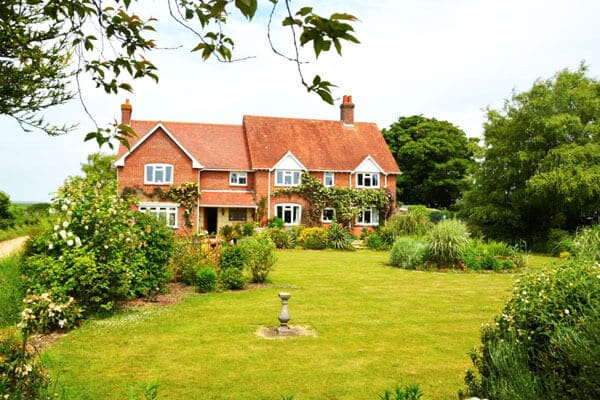
-
- Land real estate refers both to developed and undeveloped lots. Some examples are:
- Farms
- Ranches
- Vacant land
- Land real estate refers both to developed and undeveloped lots. Some examples are:
How You Can Make Money from Your Real Estate Investment in the Philippines
A successful venture isn’t just all about choosing the right type of real estate to invest in. You also have to look into possible money-making opportunities.
Although the idea of real estate investing can be simpler than expected, that doesn’t mean you’re limited to one or two strategies for generating profit. Here are 5 ways you can make money from your real estate investment in the Philippines!
1. Long-Term Residential Rentals
It’s fairly common for people to buy property at low prices and sell them or rent them out at marked-up rates. Many Philippine residents will also be familiar with the idea of long-term residential rentals, either as tenants or landlords.
If you’re thinking of taking this route in real estate, be sure to find a great location. This can be near a commercial business district (CBD) or a university. You’ll never run out of tenants!
2. House Flipping
Ever watched a home renovation show, like Yard Crashers or House Hunters? It can be surprising to see run-down properties suddenly gain incredible selling value after a makeover. Because of these shows, people are realizing that even unattractive properties have potential to generate profit. Some adventurous folk actively seek out the worst homes in the best neighborhoods for wholesaling or flipping.
Thinking of flipping some houses yourself? You’ll want to gather business contracts who deal with construction, interior design, architecture, and legal industries among others. This ensures that you won’t hurt the property’s value because of an amateur home renovation mistake on your part.
3. Contract Flipping
Here’s one relatively low-risk method of generating profit from your real estate investment in the Philippines. Find a distressed seller, put their property under contract, and then assign the contract to a motivated buyer. The contract flipping will be much faster if you’ve pinpointed a go-to buyer beforehand.
The beauty of this kind of wholesaling is that it lets you earn without putting down a lot of capital at the start. Your profit from real estate investing will be the difference between the sale prices before and after the contract has been flipped and assigned.
4. Vacation Rentals
Do you happen to own property in Tagaytay, Palawan, or any other tourist locale in the Philippines? Or do you have your eyes on a condominium in those areas? You might be surprised at how many travelers are willing to rent your property for their stay. In fact, your vacation home can even become a source of substantial passive income. All you have to do is put it up for rent. Condotels and Airbnb are great ways to start.
5. Ancillary Revenue
Ancillary revenue refers to income generated by services that enhance your primary offering. Think of popcorn at cinemas, car wash services at gas stations, or in-flight snacks. You can give your income a nice boost by bringing ancillary revenue into the picture. Some ideas for you to try are honesty stores and vending machines.

Foolproof Real Estate Investment Ideas
Have a rough idea of how you’ll be earning from your real estate investment yet? For your game plan to really take shape, your next step will be to choose a tried and tested investment idea.
In the industry, you basically have to look into properties that generated huge and continuous profit for other real estate investors before. These are specific types of property that buyers and tenants in the Philippines generally look for the most.
During the past two years, there has been a huge increase in rents for residential properties. According to Colliers, 1-3% increase in rents by 2020 is most likely to happen.
Let us help you narrow down the best real estate investment ideas that can turn in a huge profit for you.
1. Condominiums
Condominiums have gained widespread appeal for their convenience and economy. Millennials in the workforce prefer to live near their workplace to avoid rush hour traffic. At the same time, young families may find condos to be a suitable home where they can start out. Professionals may also look for condotels or condos for rent during business trips to central business districts.
Last year alone saw the addition of 35,000 residential condominium units to total existing stock, for a total of 338,000 units. Most of this stock is in Quezon City, Makati, and Taguig, according to real estate services firm JLL.
2. Residential Properties in General
The rise in demand is far from limited to condos and condotels. You can also invest in family homes and multi-unit apartments, which are popular among newlyweds. Try styling your real estate investment in the Philippines as a place where tenants can live, work, and play without experiencing hellish rush hour traffic.
3. Vacation Homes
Take the Philippines’ abundance in world-class tourist spots and pair it with the rise of backpackers and budget travelers. It’s important for travelers to find affordable places to spend the night, you’ll earn a lot if you can provide them with what they need!
Year after year, millions of tourists continue to flock to Bohol, Palawan, Tagaytay, Batanes, Siargao, and other top destinations. Interestingly, the Philippines still outperformed itself in 2018 despite the six-month rehabilitation of crown jewel Boracay. 7.1 million visitors came to the Philippines anyway, according to the Department of Trade and Industry (DTI). That also equates to 7.1 million travelers looking for a convenient place to stay!
4. Warehouses
The revenue of the eCommerce industry is expected to reach $996 million or P53 trillion this year. With those figures, you can imagine the high demand for warehouses and other types storage by online shopping sites.
The DTI is also catching on through its eCommerce roadmap to 2020. According to this roadmap, eCommerce might be contributing as much as 25% of the Philippines’ gross domestic product by the end of next year! The roadmap includes helping micro, small, and medium businesses go digital to compete on a global scale.
Some real estate giants in the Philippines have started making investments geared towards the current boom in the logistics industry. A common strategy is to purchase key assets that later come into play during the construction of mega-warehouses. These massive logistics centers can house storage, packaging, and shipping operations all under one roof!
5. Empty Lots in Strategic Areas
It’s common for investors to zero in on the most run-down house in an otherwise attractive neighborhood. They purchase it cheaply, build a beautiful house, and either sell it at a premium or take pride in how little they’ve spent on a new home.
An empty lot on a main road carries the same potential. In addition, some of these empty lots lie right between commercial buildings or residential spaces! All you have to do is determine whether you’ll transform the empty lot into a commercial or residential building. Also, be sure to secure authentic paperwork from the seller.
6. Dormitories
Dorms certainly have a stable market, but you might still be surprised by the sheer demand for them! Aside from students, you’ll find Philippine offshore gaming operators and young professionals in central business districts searching for convenient places to stay.
It definitely helps if you put up a dorm in a safe place that is close enough to tenants’ schools or workplaces. Bonus points if you’re near a supermarket or convenience store.
7. Low-Rise Commercial Buildings
Ever seen a low-rise commercial building under construction? Chances are you’ve actually seen more than one at this point, and for good reason.
These buildings can provide steady profit for a considerable period of time, with a single rental contract lasting between 5 and 10 years. Now, imagine an entire string of commercial units with one steady-paying tenant each! You’ll also want to get a nice wide range of tenants. Nearby residents will appreciate having a laundry shop, a remittance center, a mini-mart, a bank or two, and a selection of food stalls next door.
Another option for low-rise commercial buildings is to lease them as office space. For one, flexible workspaces are coming into style thanks to their benefits for employees. Also, POGOs are predicted to take up between 20-23% of total office space in the Philippines in 2019, according to Colliers International.

Best Cities for Real Estate Investments in the Philippines
You’re already convinced that real estate investment is the way to go. The question now is, where?
Finding a good location is a huge part of a successful real estate investment. It helps to have an updated list of the best choices you have. Check out these 10 cities, all of which are either prime locations or potential hotspots for real estate investments in the Philippines.
1. Quezon City
Say hello to the largest city in the Philippines, at least by population. Almost 3 million Filipinos call the highly urbanized Quezon City their home. The city also boasts of a strategic location in the northeast corner of Metro Manila, right next to Bulacan and Rizal.
An abundance of employment prospects, wellness centers, and recreational areas makes Quezon City an ideal place for your next investment. It helps that it has a relatively young population, with around two-thirds of its residents under the age of 40.
2. Makati City
Did you know that there are around 60,000 commercial and retail establishments in Makati? No wonder real estate investments in the area are at a premium. You’re almost guaranteed to get inquiries from curious buyers and would-be tenants if you invest in a condominium here! Aim for properties in or around the Central Business District for best results.
Numerous multinational firms have set up Philippine bases in Makati, transforming the city into a highly developed financial center. This also means that it has the full set of urban amenities for any home buyer.
3. Muntinlupa City
This city manages to both be highly urbanized and eco-friendly, making it a refreshing choice for real estate investments in the Philippines. It is home to Filinvest City, which calls itself a “residential haven” and “garden Central Business District.” Countless multinational corporations including Verizon Wireless, Convergys, and even the Hershey Company have offices in this area.
Muntinlupa also has a prime location as the gateway to Southern Luzon. The cities of Bacoor, Dasmariñas, and San Pedro are all along the borders of Muntinlupa.
4. Baguio City
Some trademarks of the Summer Capital of the Philippines are its pine trees, cool temperatures, and delicious ube jam. Curiously, around half of the residents here are students! Baguio City is both a top tourist destination and a bustling university town. In other words, there will almost always be someone looking for a place to rent in Baguio City, whether for travels or for studies.
Real estate in Baguio City manages to be more affordable without sacrificing quality. At the same time, the city is wonderfully serene despite continuous development. New businesses also pop up frequently, creating a growing market for commercial rentals.
5. Tagaytay City
Together with several other nearby local government units, Tagaytay City is part of the Tourism Haven and Food Basket of Cavite. It’s not surprising that this area is also a hotspot for real estate investments in the Philippines!
The fresh, cool temperatures are already enough to draw tourists and retirees to Tagaytay. However, the area also enjoys light traffic and an abundance of natural wonders like the nearby Taal Lake. On top of that, the cost of living here is considerably lower compared to Metro Manila. Invest in real estate here and you’ll be giving your tenants and buyers a real treat.
6. Angeles City
The Clark Freeport and Special Economic Zone is a rising business and logistics hub spanning Bamban, Capas, Mabalacat, Porac, and Angeles. The government is set on helping this zone develop into a true central business district with projects such as the Subic-Clark Cargo Railway, the Clark Airport Expansion, and the NLEX-SLEX Connector Road.
Expect demand for rentals and other real estate properties in Angeles City to shoot up once development here goes into full swing. It may be a good idea to start real estate investing early!
7. Cebu City
The market for condominiums continues to grow in the Queen City of the South. Properties with leisure facilities are especially in demand. Invest in a condo here, and you can expect to get inquiries from employees at voice BPO companies and KPO companies.
Cebu City is also a top location for retail property. Commercial hubs are full of spacious shopping malls and foreign brands, while downtown areas are lined with classic retail outlets. One recommendation from Colliers International is to set up a retail outlet away from the main roads. Customers will appreciate having shopping options that aren’t surrounded by heavy traffic!
8. Iloilo City
Houses and lots still make up most of Iloilo City’s residential property market. However, more and more BPO employees and OFWs are looking for convenient rentals as well. You can’t go wrong with a condominium investment here! In fact, pre-selling is now open for new developments within the city.
The government also has several infrastructure projects lined up for Iloilo, including the Iloilo International Airport Project. Upon completion, the upgraded airport will most likely open the doors for even more tourists to stop by Iloilo. And these tourists will definitely look for convenient and reasonably priced rentals!
9. Bacolod City
In contrast to Cebu and its growing demand for condominiums, the City of Smiles leans towards horizontal developments such as houses and lots. One possible strategy is to invest in houses and lots while keeping tabs on the demand for condos within the city center.
BPO and KPO operations make up most of the demand for office property in Bacolod. More companies are also after the convenience of flexible workspace and plug-and-play offices.
Bacolod’s market for retail property shows no sign of slowing down, either. Homegrown brands and established retail shops continue to hold up even with competition from major shopping malls.
10. Davao City
One of the best places to invest outside Metro Manila happens to be the Philippines’ largest city in terms of land area. For one, Davao has a very strategic location. Aside from domestic flights, Davao International Airport carries direct flights to Singapore, Hong Kong, and Quanzhou. Tourists often stop by this city on their way to other provinces in Mindanao.
You’ll also spend less while doing business in Davao compared to Manila and other important Asian cities. Several of the Philippines’ biggest corporations have offices here, in fact!
Condominiums are currently in demand in Davao City. OFWs are now investing in condos here, while locals are looking for residential spaces near their workplaces. If you’re thinking of investing in real estate in Davao City, you’d better move fast!
Where to Find Properties for Sale in the Philippines
While classified ads in newspapers are still a reliable resource, you can also easily find real estate classifieds online. Facebook is certainly handy, but sometimes you might be looking for a more dedicated search tool. This is especially the case if you’re thinking of investing in real estate somewhere far from your actual location.
Fortunately, the Philippines has several websites dedicated to the search for the perfect real estate investment. You can start by checking out the 15 sites listed below!
1. Lamudi
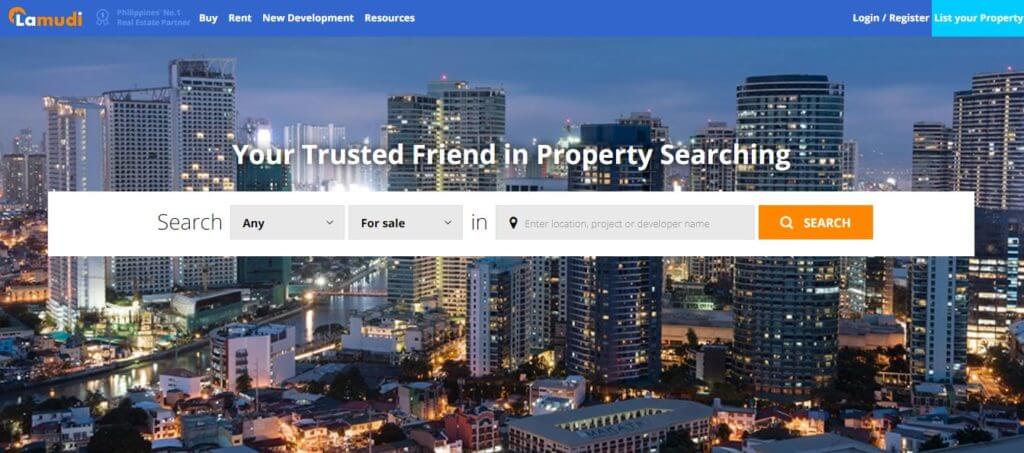
Lamudi is your portal to the newest developments from reliable sellers within Metro Manila. Its search function is sleek and straightforward enough, but it also allows you to search by project or developer name. Scroll down to the bottom of the home page and you’ll see guides to popular neighborhoods as well as a one-glance directory.
2. Property24
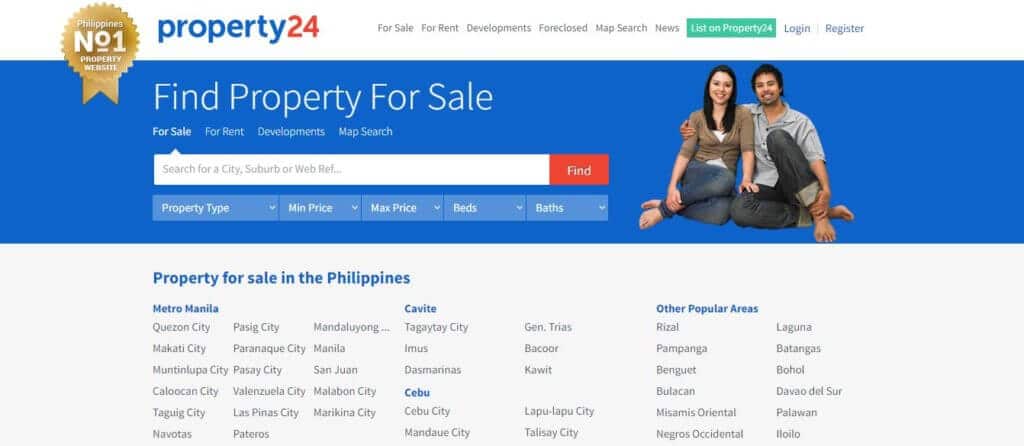
On Property24, you can easily browse for real estate of all types, from townhouses to farms to industrial buildings. The site lets you search by type, area, and even number of bedrooms and bathrooms! There’s even a Map Search to help you find Philippine properties for sale in a preferred area.
3. Dot Property
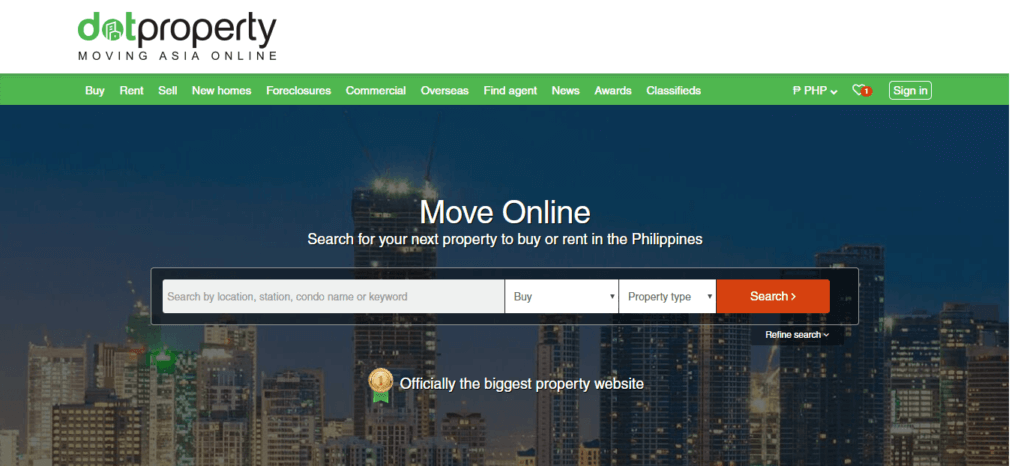
The home page of Dot Property presents you with a quick list of “properties of the month,” in case you’re feeling flexible in your search. Otherwise, you can look up properties by types, seller, and bank. Go through the navigation bar at the top of the page to find specific pages for hotels, resorts, overseas properties, and more!
4. Hoppler

Beneath its minimalist search bar, Hoppler has given visitors the option to toggle an entire menu of additional filters! Where else can you search for a 4-bed, 2-bathroom townhouse with 1 parking lot and a balcony? Aside from that, the home page has quick lists for popular locations and properties in the Philippines, as well as projects that have gone on pre-selling.
5. MyProperty

Want to compare real estate offerings from both certified partners and individual sellers? Enter your query into the MyProperty search bar and see what you get. You’ll see listings ranging from empty lots in Quezon City to condominiums in Tagaytay. Aside from that, the site has a handy loan calculator under “Resources” on the navigation bar.
6. ZipMatch

One of the featured lists on ZipMatch is a collection of trending homes for first-time buyers. Use it to get a peek at what everyone else is checking out! Scroll down on its home page, and you’ll also come across a gallery of 360-degree 3D tours of various developments in the Philippines to help you compare.
7. Trovit
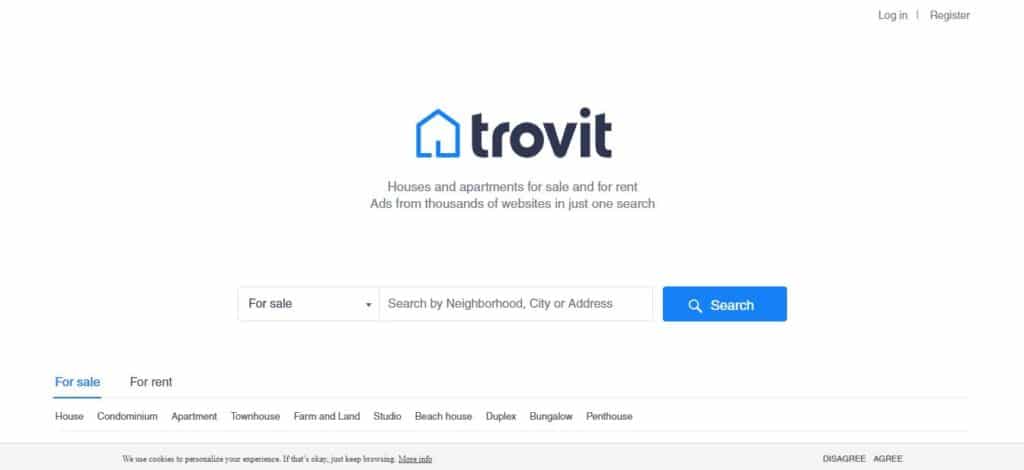
Trovit PH primarily lets you search by location. At the bottom of its home page, you’ll find a quick rundown of the areas you can search. Another interesting feature is the list of related searches, located beneath the filters on the left side of the results page. This lets you try out suggested searches similar to yours, such as “room Anonas Quezon City” or “beach Mimaropa.”
8. Philippines Properties

Philippines Properties has an easy-to-use search function that can be more than enough for many to-be investors. However, you can also browse property by types by clicking “Property” on the navigation bar. Right beside that is “Sellers,” where you can check out registered sellers’ profiles and listings at once!
9. Cebu Realty and Brokerage

Yes, Cebu has its own real estate site! Cebu Realty & Brokerage works with an entire network of other real estate professionals for investors’ convenience. Visit its Listings pages, and you’ll see that the site provides detailed information about each property from the get-go. For example, a condo listing often includes the complete address, lot area, price, and number of bedrooms and bathrooms.
10. Davao Real Estate
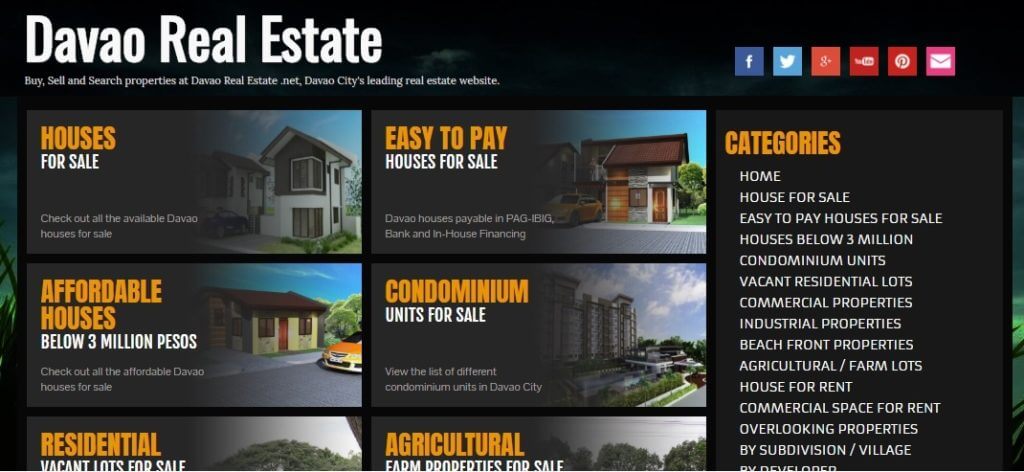
Davao has its own dedicated real estate site, too. Navigation is a breeze on Davao Real Estate, with clear labels and sections to guide potential investors in the Philippines. The categories on the right-hand side include specific perimeters for easy searching. So, aside from looking up “houses for sale,” you can also go for “houses below 3 million”!
11. Foreclosure Philippines

With a name like Foreclosure Philippines, you’d expect this site to be a valuable resource regarding foreclosed properties throughout the country. And it certainly lives up to the name! Scroll past its search bar to find several updated lists of foreclosed properties, whether under government agencies or Philippine banks.
12. BDO

With BDO’s simple search function, you’ll find the perfect piece of real estate in the Philippines with ease. Interestingly, there are also postings for cars, clubhouse shares, and even chattel (in case you somehow need a photoplotter or a potato chip scoring machine).
13. PSBank
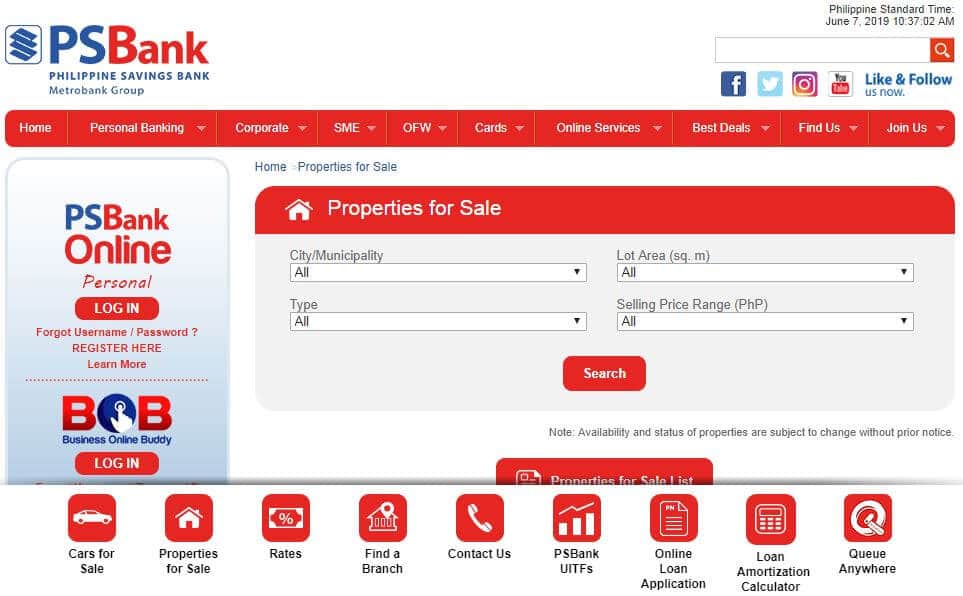
The PSBank site lets you look up properties by city, lot size, type, and price range. At the same time, you can download a list of Philippine properties for sale. There are also information sheets, helpful lists, and agreement forms for your convenience.
14. Security Bank
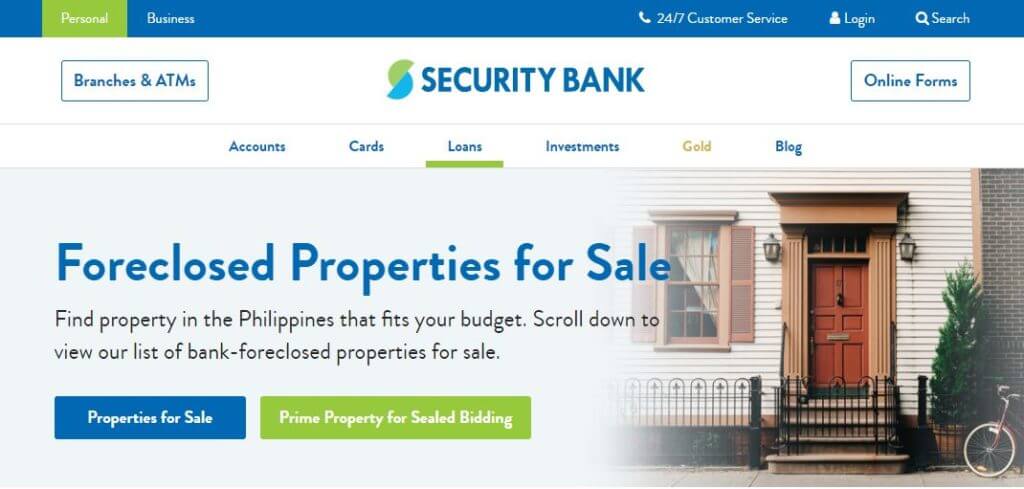
Security Bank updates its downloadable list of properties weekly! Scroll down and you’ll see a list of areas you can browse, neatly grouped into North Luzon, NCR, South Luzon, Visayas, and Mindanao. There is also a helpful “How to Purchase Property” section at the bottom of the page.
15. Buy & Sell PH
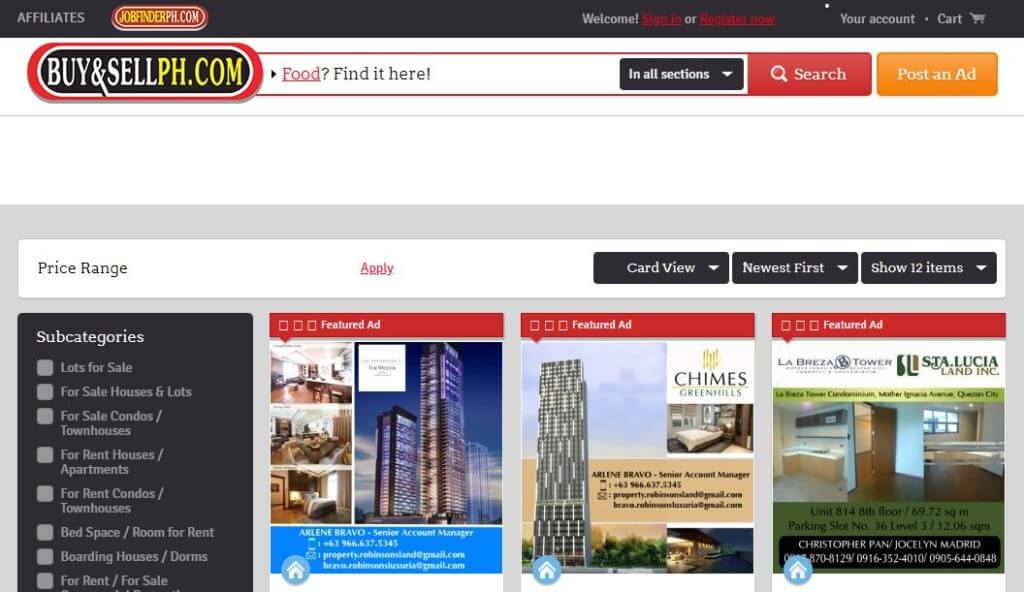
Some Filipinos might remember the Buy & Sell PH magazine from bygone years, filled with postings of cars, appliances, and real estate on sale. That magazine now has a website complete with its classic logo! The site has a user-friendly list of checkable search filters on the left sidebar.
Step by Step Guide to Owning a Real Estate Property in the Philippines
In theory, you just have to complete all requirements and acquire a notarized Deed of Sale to buy property in the Philippines. However, there are various steps involved depending on the type of property being bought. The purchase can take around a month to complete. And it can be a very confusing month if you’re not sure of what to do or what to prepare after each step!
To help you out in owning a real estate property in the Philippines, here are three lists you’ll want to remember: legal steps, necessary documents, and transaction fees for a transfer of titles. Get your notes ready!
9 Legal Steps for Transfer of Titles for Lands and Apartments
-
-
- The buyer and seller agree on a property sale.
- A lawyer creates and notarizes a Deed of Absolute Sale (DoAS) for them.
- Both parties secure a Land Tax Declaration from the BIR and submit it to the Office of the Municipal Assessor.
- The buyer pays real estate tax at the Office of the Municipal Treasurer.
- The Municipal Assessor determines the property’s market value.
- The buyer pays transfer taxes to the Assessor’s office.
- Then, the Documentary Stamp and Capital Gains Taxes are paid at the BIR’s office. The buyer and seller shoulder these respectively.
- The Registry of Deeds cancels the old title and awards a new one to the buyer, officially granting them ownership.
- The new owner of the property gets a photocopy of the new title and visits the Assessor’s Office to request a tax declaration.
-
NOTE: This process is specifically for apartments and land real estate. It can differ slightly for other types of real estate property in the Philippines.
You’ll want to ask for professional help here! A credible real estate agent can be a valuable source of insight into different types of property. You can also consult with your bank before getting pre-approval, which can give you an advantage over other potential buyers. If you’ve secured pre-approval, the bank can offer to lend you money in case your dream property is a bit beyond your budget.
Types of Real Estate Documents
-
- Contract to Sell (CTS) – states the developer’s agreement to transfer ownership of a certain property to its buyer once the terms of sale are complete.
- Deed of Sale – reflects the property sale agreement between buyer and seller. This binding document is only executed once the buyer fully pays for the property.
- Condominium Certificate of Title – serves as proof of ownership issued by the Registry of Deeds
- Declaration of Real Property (Tax Declaration) – indicates the market and assessed value of the property, which will be used to calculate real estate tax. The Municipal Assessor is in charge of maintaining this document.
Transaction Fees for Real Estate Purchases in the Philippines
-
- Notary Fee – 1-2% of the property value. Often negotiable. Paid by the buyer.
- Title Registration Fee – varies according to a published registration fee table; generally around 0.25% of the sales price.
- Documentary Stamp Tax – 1.5% of the sales price, zonal value, or fair market value, whichever is highest.
- Local Transfer Tax – 0.5% to 0.75% of the sales price, zonal value, or fair market value, whichever is highest. The rate goes for 0.50% for properties in provinces, and 0.75% for properties within Metro Manila.
- Capital Gains Tax – 6% of the property’s sales price, zonal value, or fair market value, whichever is highest. The seller often pays for this. However, sometimes the buyer pays for it, like when the capital gains tax is included in the sales price. Note that only capital assets (properties not used for trade or business) are subject to this tax.
- Real Estate Agent’s Fee – usually around 0.25% of the sales price, but sometimes varies according to a published registration fee table. Real estate agents usually do the registration process while asking for no more than the commission, however.
Top Tips for Real Estate Investing in the Philippines
Just figuring out the basics of real estate in the Philippines will already put you ahead of many other beginning investors. Not everyone knows where to start their property search, for one. It’s also completely possible for a new investor to get stuck in the property transfer process!
However, the basics alone might not be enough for you to get the most out of your venture. Here are 8 tips to remember when you go for real estate investment in the Philippines!
1. Get Pre-Approved ASAP
If you’re able to get pre-approved for a mortgage, it means you’re financially ready to make your investment. The road to pre-approval can help you identify obstacles to securing your dream property, such as poor credit or outstanding debts. Pre-approval also serves as an agreement that the bank can lend you a bit of extra money to finalize your property purchase. You can also look into loan options in the Philippines for your real estate investing needs.
2. Draw the Line Between Your Wants and Needs
You might find it a little difficult to scout out a property that meets your exact real estate investing requirements. Before you begin your search, you’ll want to take some time to identify your wants and needs. For example, having a bedroom or two is a non-negotiable need, but do you really need a hardwood floor?
Start by listing down what you like and what you don’t like about your current residence. Recall what you like about other people’s homes. Think about where you’ll be in the next 5 years and how that might affect what you want or need in your property.
3. Secure a Good Location
The idea of finding the “worst house on the best street” will take you a long way in real estate investing. Check popular neighborhoods for properties that need improvement. You can build equity easily simply by giving this kind of property a makeover or an upgrade.
You’ll also want to keep tabs on central business districts and potential growth areas. There will always be a demand for living space in central business districts, while rental prices can soar once future economic hotspots begin to take off. If you don’t mind moving around the country, you can certainly give Angeles, Bacolod, or Davao a try.
4. Remember Your Target Market
Feel like pouring your budget into fitting your new condotel with all kinds of luxurious amenities? You won’t profit much from it if it’s way beyond the budget of nearby households. Either adjust your investment to fall within the financial capacity of low-to-middle incomes or find a similar investment in a more upscale part of the country. This also works in reverse.
5. Align Your Investment with Your Financial Goals
Decide early on how exactly you’ll be earning from your real estate investment in the Philippines. Will you be raking in your profits with a single big-time sale, or bringing in a steady flow of cash from rental fees instead? Your answer can help you map out your goals and plans for the next few years.
If you’ve chosen to rent out your property, you’ll need to know when you’ll start seeing a return on investment (ROI). To do this, calculate your income per month by subtracting your expenses from your revenue. Then multiply this by 12 to get your income per year. Finally, divide the property price (together with any repair costs) by your yearly income to find out how many years it will take for your investment to break even.
You may then adjust your rates and expenses if you’re aiming to save up a certain amount of money within a fixed number of years.
6. Research, Full Stop
It can be painful to find out that a huge investment from a few years ago is actually nowhere near worth the price. Or that you won’t be able to push through with your planned purchase at all because you completely missed a crucial issue. To avoid this situation, you need to arrive at a solid decision backed by research.
-
-
- Developer – Check their track record. Do they deliver on time? Do their previous developments show cracks less than two years in?
-
- Financing Strategy – Figure out how you’ll be paying for your new investment. Are there any upfront fees? Will you need to tap bank loans or your PAG-IBIG fund to cover the cost? Do you have to prepare any documents in advance for this?
-
- The Property Itself – You’ll be investing your hard-earned money here, so you can’t just rely on what you see online before sealing the deal. Conduct a physical inspection. Take note of open house viewing dates and set aside a day to drop by. You might also be able to chat with brokers, customers, and fellow investors during the open house viewing.
-
- Property Management – How do repairs work? What is the garbage collection schedule? What facilities and amenities are available to residents? If the developer advertises the property as an accessible haven with all the conveniences of urban life, how well have they delivered on that promise?
-
7. Manage Your Property Well
Your property will retain its value for a long time if you make efforts to keep it in top shape! Check on the property regularly in case anything needs to be fixed or replenished. When needed, conduct repairs as soon as possible.
Renting out your property? You’ll also want to screen tenants to avoid hassle down the road. Here are a few important points for the screening process:
-
-
- Check Out Their Credit History. If the candidate has huge unpaid debts or a couple of maxed-out credit cards, chances are they’ll have a hard time keeping up with rental fees.
-
- Run a Background Check. Think twice about bringing in a tenant who has been evicted recently, especially if it’s not their first eviction. Same goes with candidates who have criminal records.
-
- Interview Their Previous Two Landlords. Aside from asking if the potential tenant is fully paid on their end, try to find out a bit about the tenant’s lifestyle.
-
- Chat with Their Employer. This assures you that your future tenant has a steady source of income and the capacity to pay rent. Oh, and consider it a red flag if you find out that your tenant has lied to you about their job.
-
- Interview the Candidate. Ask about pets, the idea of future roommates, the setup of a typical workday, and frequent visitors such as family and friends. Just remember, you’re not allowed to breach their privacy or discriminate them based on race, gender, faith, disability, or nationality.
-
Real estate in the Philippines remains a stable and thriving market. Opportunities abound in this industry for people with big or small budgets especially with the best properties to buy.
CitiGlobal, a trusted real estate developer in the Philippines, offers options for real estate investment especially in the country’s prime locations. We can help you find a home or an income-generating property that can offer the highest return on investment.
Liked this post? Visit our blog for more helpful information, especially for OFWs saving up for a family home in the near future.
Got Other Questions About Real Estate Investment in the Philippines? We Can Help.



